
|
You entered: Mars
 Mars Odyssey Lifts Off for Mars
Mars Odyssey Lifts Off for Mars
9.04.2001
Next stop: Mars. On Saturday the 2001 Mars Odyssey spacecraft lifted off from Cape Canaveral, Florida on a path to enter orbit around Mars in late October. Pictured above, a Delta II rocket lifted...
 Mars Express Close Up of the Face on Mars
Mars Express Close Up of the Face on Mars
25.09.2006
Wouldn't it be fun if clouds were turtles? Wouldn't it be fun if the laundry on the bedroom chair was a friendly monster? Wouldn't it be fun if rock mesas on Mars were faces or interplanetary monuments? Clouds, though, are small water droplets, floating on air.
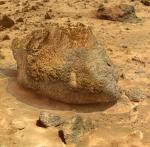 Yogi Rock on Mars
Yogi Rock on Mars
9.03.1998
Yogi is possibly the best photographed rock on Mars. By combining many pictures taken during the Mars Pathfinder Mission last year, scientists were able to create a super-resolution, digitally enhanced image that better allows them to study Yogi's surface and more accurately determine how Yogi was formed.
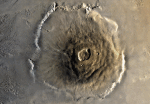 The Mountains of Mars
The Mountains of Mars
19.07.1995
Volcanic activity on Mars has produced towering mountains. The largest one, Olympus Mons, is pictured here in this Viking Orbiter image. Olympus Mons is a shield volcano nearly 15 miles high and over 300 miles wide at its base.
 The Wind on Mars
The Wind on Mars
12.01.1999
Wind erosion has been discovered on Mars. Pictures of regions surrounding the north polar cap show sand dunes covered in frost. In places, however, this frost has been eroded to uncover the dark sand underneath.
 The Grand Canyon of Mars
The Grand Canyon of Mars
20.07.1995
The Mariner Valley, also known as the Valles Marineris canyon system, appears in this mosaic of images from NASA's Viking spacecraft as a huge gouge across the red planet. This "Grand Canyon" of Mars is about 2500 miles long and up to 4 miles deep.
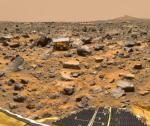 At Work on Mars
At Work on Mars
14.07.1998
To learn about the history ofMars, just ask the rocks. Last year, that's exactly what the robot rover Sojourner did. Sojouner can be seen, above, analyzing a rock nicknamed Moe, trying to discern its past.
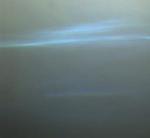 Ice Clouds over Mars
Ice Clouds over Mars
13.10.1997
Mars has clouds too. The above true color image taken in August by Mars Pathfinder shows clouds of ice high in the Martian atmosphere. Unlike Earth's atmosphere which is composed predominantly of nitrogen and oxygen, Mars' atmosphere is composed mostly of carbon dioxide.
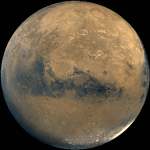 A Huge Impact Crater on Mars
A Huge Impact Crater on Mars
3.02.1996
What hit Mars? The impact crater Schiparelli near the center of the above image was likely caused by a collision with an object the size of an asteroid. Also evident in this full face mosaic of Mars are numerous craters from many other impacts with smaller objects over billions of years.
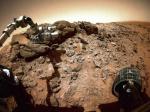 Attacking Mars
Attacking Mars
13.03.2007
The Spirit rover attacked Mars again in 2005 September. What might look, above, like a military attack, though, was once again just a scientific one - Spirit was instructed to closely inspect some interesting rocks near the summit of Husband Hill.
|
January February |
|||||||||||||||||||||||||||||||||||||||||||||||||